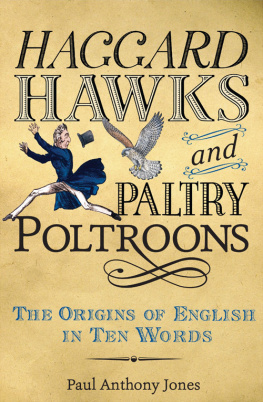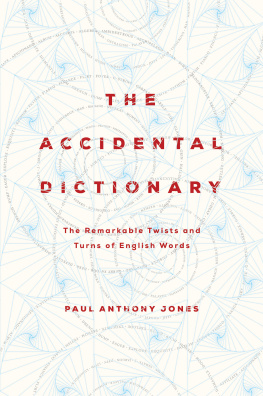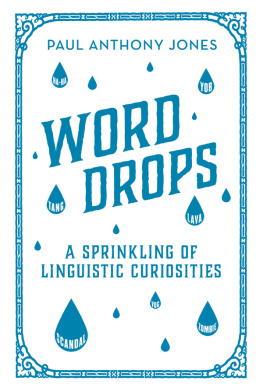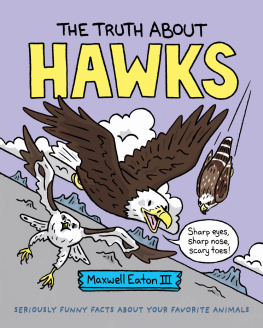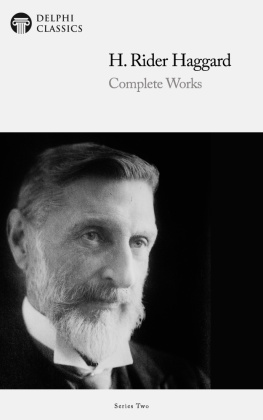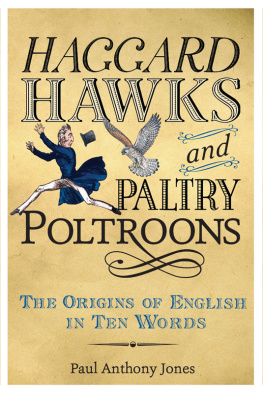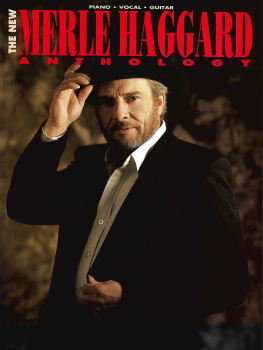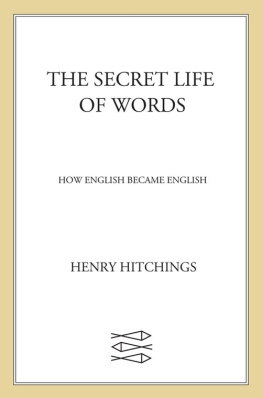Paul Anthony Jones - Haggard Hawks and Paltry Poltroons: The Origins of English in Ten Words
Here you can read online Paul Anthony Jones - Haggard Hawks and Paltry Poltroons: The Origins of English in Ten Words full text of the book (entire story) in english for free. Download pdf and epub, get meaning, cover and reviews about this ebook. year: 2013, publisher: Constable, genre: Home and family. Description of the work, (preface) as well as reviews are available. Best literature library LitArk.com created for fans of good reading and offers a wide selection of genres:
Romance novel
Science fiction
Adventure
Detective
Science
History
Home and family
Prose
Art
Politics
Computer
Non-fiction
Religion
Business
Children
Humor
Choose a favorite category and find really read worthwhile books. Enjoy immersion in the world of imagination, feel the emotions of the characters or learn something new for yourself, make an fascinating discovery.
- Book:Haggard Hawks and Paltry Poltroons: The Origins of English in Ten Words
- Author:
- Publisher:Constable
- Genre:
- Year:2013
- Rating:3 / 5
- Favourites:Add to favourites
- Your mark:
- 60
- 1
- 2
- 3
- 4
- 5
Haggard Hawks and Paltry Poltroons: The Origins of English in Ten Words: summary, description and annotation
We offer to read an annotation, description, summary or preface (depends on what the author of the book "Haggard Hawks and Paltry Poltroons: The Origins of English in Ten Words" wrote himself). If you haven't found the necessary information about the book — write in the comments, we will try to find it.
Haggard Hawks and Paltry Poltroons: The Origins of English in Ten Words — read online for free the complete book (whole text) full work
Below is the text of the book, divided by pages. System saving the place of the last page read, allows you to conveniently read the book "Haggard Hawks and Paltry Poltroons: The Origins of English in Ten Words" online for free, without having to search again every time where you left off. Put a bookmark, and you can go to the page where you finished reading at any time.
Font size:
Interval:
Bookmark:
Paul Anthony Jones
Constable London
Constable & Robinson Ltd
55-56 Russell Square
London WC1B 4HP
www.constablerobinson.com
First published in the UK by Constable,
an imprint of Constable & Robinson Ltd., 2013
Copyright Paul Anthony Jones 2013
The right of Paul Anthony Jones to be identified as the author of this work has been asserted by him in accordance with the Copyright, Designs & Patents Act 1988
All rights reserved. This book is sold subject to the condition that it shall not, by way of trade or otherwise, be lent, re-sold, hired out or otherwise circulated in any form of binding or cover other than that in which it is published and without a similar condition including this condition being imposed on the subsequent purchaser.
A copy of the British Library Cataloguing in Publication
Data is available from the British Library
ISBN 978-1-4721-0806-7 (hardback)
ISBN 978-1-4721-0941-5 (ebook)
Printed and bound in the UK
1 3 5 7 9 10 8 6 4 2
Jacket design: mark-cavanagh.co.uk ; Jacket photos: Corbis, Alamy
For Phil, Matt and Arno
Any book of this nature is of course indebted to the scholars, lexicographers, compilers and wordsmiths from whose decades of work it is assembled. The material featured here has been pulled from a variety of different sources, but most notably the Oxford English Dictionary (still the single greatest scholarly achievement going) and the separate Oxford Dictionary of Word Origins; both the Chambers Dictionary and exceptional Chambers Slang Dictionary; Brewers Dictionary of Phrase & Fable; and Merriam-Websters Collegiate Dictionary. To all those involved in producing these exceptional titles I am immensely grateful.
Personal thanks to my agent, Andrew Lownie; to Hugh Barker at Constable; and to my parents, Leon and Maureen, for their unparalleled patience and proofreading ability.
Haggard is a strange word. Five centuries old, having been adopted into English from French in the mid-1500s, on its first appearance in the language it was a falconers term used to refer to a wild hawk captured as an adult and then trained to hunt and retrieve prey. As these haggard hawks tended to remain quite wild and unpredictable even after their training, especially compared to captive-bred birds, over time the meaning of the word developed to come to describe anything similarly unruly, erratic, world-worn and well, haggard. As unusual as this history is, however, haggard is not alone. It is just one of a number of English words, including allure, turn-tail, rouse, poltroon and even codger, that all share some kind of connection to falconry. And this is precisely what this book is all about.
Assembled here are fifty lists of ten words, each group of ten having some linguistic quality or etymological quirk in common. From words derived from places in Ancient Greece to words derived from colours, from unusual animal names to words with fictitious histories, and from abbot, abdest and abelmosk to zed, zigzag and zombie, the 500 entries listed in Haggard Hawks and Paltry Poltroons comprise some of the most remarkable words and word origins in the entire English language. Here you will find the connection between a family tree and a storks foot, what connects a sitcom to a hybrid zebra, which item of gym equipment was originally a jailhouse punishment, what the first blockbuster was, how long an ohnosecond is, which weapon is named after a musical instrument, how to stop plagiarism with a spelling mistake, what you should really call a unknowledgeable critic, how to cure a fever with a magic word and where to find a vampire in a theatre. The entries here mix the familiar with the unfamiliar, the exceptional with the everyday, and the old with the new you might not know what an aphengescope is, or how to lucubrate, but they are related to the chocolate clair and the name of the shortest bone in your arm.
So, where better to begin than where the English language calls home...
Besides the ten words listed in this chapter, the English language also contains a vast number of phrases and expressions that make reference to some British location, like shipshape and Bristol fashion and carrying coals to Newcastle. Expressions like these are often rooted in an areas association with a particular industry or historical event Bristol fashion is derived from the citys world-renowned seafaring proficiency, while the naturally coal-rich north-east of England (as in WALLSEND) implies that carrying coals to Newcastle would be a thankless or pointless task. Likewise, to be stabbed with a Bridport dagger was a seventeenth-century phrase meaning to be hanged, referring to the rope-making industry of Bridport in Dorset; to get yourself to Bath was a nineteenth-century way of being told that you are talking nonsense, as the citys spring waters were once widely known to be used to treat patients with mental illnesses; and to walk Newgate fashion was a Shakespearean expression meaning to walk two-by-two, like prisoners shackled together in Newgate jail.
One of the most familiar of all of these British expressions, however, is also one of the most mysterious, as the origin of to send to Coventry, a seventeenth-century phrase meaning to ostracize or ignore, is entirely unknown. Amongst the numerous suggestions attempting to explain its history are that it makes reference to a prison established in the city during the Civil War; that the locals supposed historical dislike of members of the British Army meant that anyone seen talking to a soldier would be shunned; or else that Coventry was once the site of an austere monastery, to which monks failing or disobeying their orders would have been sent to observe a strict vow of silence.
The first recorded reference to the sport of badminton in English dates from 1863, when it was described as a game played with sides, across a string suspended some five feet off the ground. Seemingly named after Badminton House, the Gloucestershire home of the Dukes of Beaufort, it is often claimed that the game originated amongst British Army officers on leave from India at Badminton in the nineteenth century. The game itself, meanwhile, is a development of the much earlier sixteenth-century game battledore and shuttlecock (first recorded, rather unfortunately, as shittle-cock in the 1601 Ben Jonson play, Cynthias Revels) in which two players, with no net between them, would attempt to bat a shuttlecock back and forth as many times as possible without letting it touch the ground.
The word bedlam, describing a scene of utter madness or confusion, was first recorded in English in the mid-1600s. Derived from a corruption of Bethlehem, the word is ultimately taken from the name of the Hospital of St Mary of Bethlehem in London, a former thirteenth-century priory that was later converted into a hospital and, after the dissolution of the monasteries, into an insane asylum, hence its modern connotations. Indeed, the word is found as the name of an asylum in Shakespeares Henry VI, Part 2 (V. i), in which Lord Clifford dismisses Richard Plantagenet, the Duke of Yorks claim to the throne with the words, To Bedlam with him! Is the man grown mad?
Font size:
Interval:
Bookmark:
Similar books «Haggard Hawks and Paltry Poltroons: The Origins of English in Ten Words»
Look at similar books to Haggard Hawks and Paltry Poltroons: The Origins of English in Ten Words. We have selected literature similar in name and meaning in the hope of providing readers with more options to find new, interesting, not yet read works.
Discussion, reviews of the book Haggard Hawks and Paltry Poltroons: The Origins of English in Ten Words and just readers' own opinions. Leave your comments, write what you think about the work, its meaning or the main characters. Specify what exactly you liked and what you didn't like, and why you think so.

